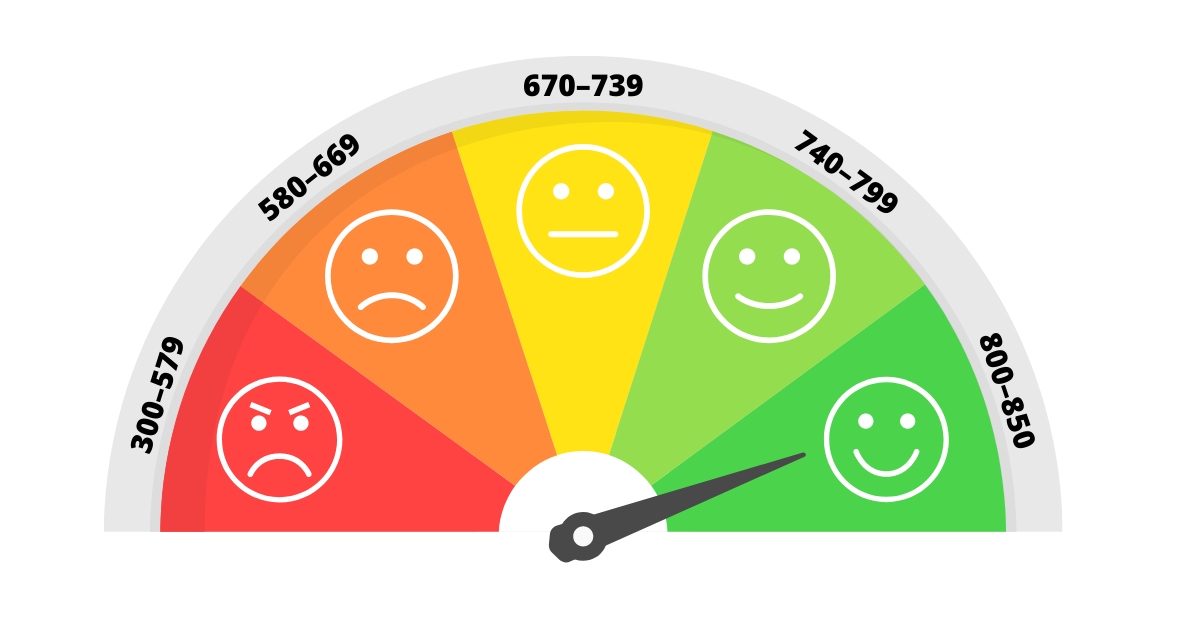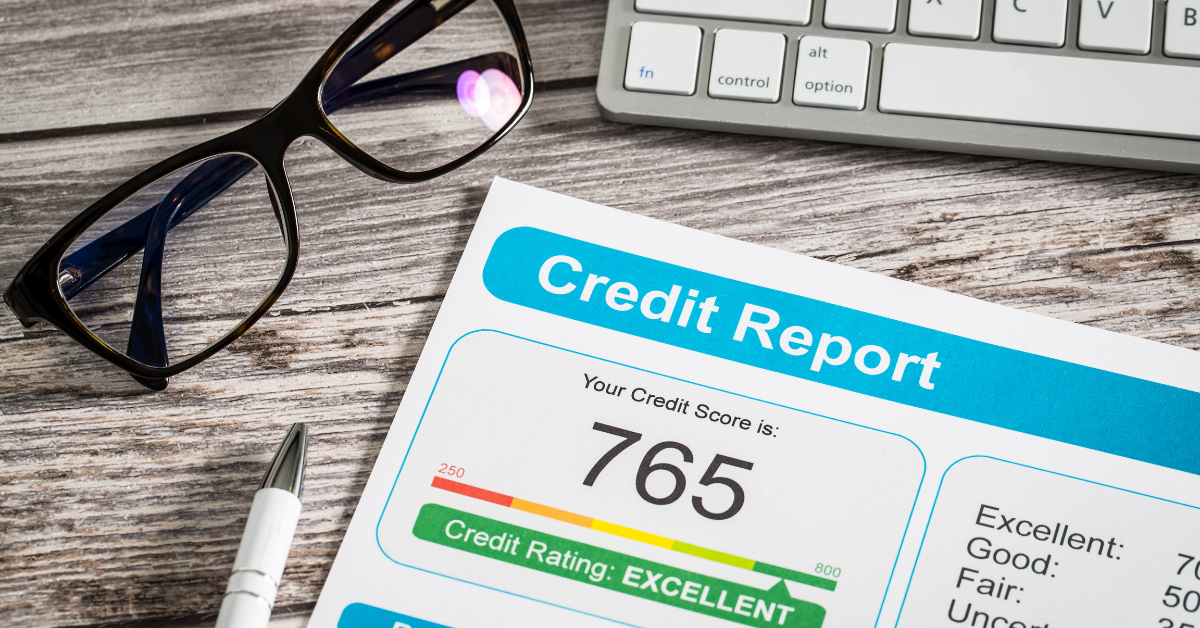What Is a Credit Score and Why Is It Important to Your Financial Future
August 13, 2021
What Is a Credit Score and Why Is It Important to Your Financial Future
August 13, 2021
Share this post:
Last Updated: February 14, 2024

Your credit score has a significant impact on many aspects of your life—your ability to obtain a credit card, mortgage, or other loans, loan interest rates and terms, and sometimes whether you can rent an apartment or how much you’ll pay for a deposit on your lease or other utilities or services. Understanding how credit scores work and the impact of your credit history are crucial to maintaining a healthy credit score and overall financial life.
What Is a Credit Score?
Your credit score is a number on a scale of 300–850 that signifies how likely you are to repay new debt and make your payments on time. Information obtained from your credit report is used to determine your credit score; this can include your length of credit history, how many open accounts you have, the total amount of debt you owe, your repayment history, the number of inquiries you’ve had on your credit report, and other information. Your credit score determines your creditworthiness, which is a key factor in a lender’s decision to offer your credit or a loan and determines the fees, terms, and interest rates you may pay.
The Fair Isaac Corporation (aka FICO) created the modern credit score, the most widely known and commonly used credit scoring system. Another frequently used credit scoring model is the VantageScore. For the purposes of this article, we’ll focus on FICO scores.
While credit score categorization varies between financial institutions, lenders, creditors, and reporting bureaus, FICO designates base credit scores in the range between 300–850 as follows:
Excellent: 800 to 850
Very Good: 740 to 799
Good: 670 to 739
Fair: 580 to 669
Poor: 300 to 579

FICO also calculates industry-specific credit scores, ranging from 250–900, often used by credit card issuers and auto loan lenders.
What Factors Affect Your Credit Score?
- Length of credit history – how long your oldest and newest accounts have been open, plus the average age of all your accounts
- Account types – your credit mix, which represents loans like mortgages and car or personal loans (called installment accounts because you make a monthly payment) and credit accounts like credit cards and other credit lines (called revolving accounts because you can repeatedly borrow money and pay it back gradually)
- Credit usage – the number of accounts carrying a balance, total amount owed, and the portion of your overall credit limit you’re using
- Payment history – on time vs. missed payments, accounts that have been sent to collections or charged-off
- Recent inquiries/activity – recent applications for credit (which show up as an inquiry on your credit report) or new accounts opened
How Does a Credit Score Work?
Your credit score is calculated as a proportion of each of the above factors, according to FICO:
- Payment history – 35%
- Amount owed/credit utilization – 30%
- Length of credit history – 15%
- New credit/inquiries – 10%
- Account types/credit mix – 10%

Again, your credit score is used to evaluate if you’re a good candidate for loans and credit cards and often to determine the interest rate you’ll receive. Lenders will run a credit check on you before issuing you a line of credit. Those with credit scores below 640 are considered subprime borrowers, which generally means you’ll receive a higher interest rate to offset the added risk of lending to you. A low credit score may prohibit you from receiving a loan or credit card. A credit score in the high ‘good’ to ‘excellent’ range (generally 700+) may result in a lower interest rate; this is advantageous to you because you’ll pay less in interest over the duration of the loan, which means more money in your pocket.
Think of credit scores as a living, breathing thing: They can and will frequently change for many reasons. Missing a payment for the first time may result in a large drop, while someone who frequently misses payments may see a slight drop, as they have begun to show a pattern of behavior. Paying down high balances on credit cards can improve your score while stopping using your credit cards could drop your score because of the lack of activity. Monitoring your score monthly—at a minimum—can indicate areas for improvement in your credit score. Keep in mind that minor fluctuations are generally not cause for concern because your score is simply a snapshot of how you’re managing your credit-based finances at a specific moment in time when the credit score is calculated.
What Factors Do Not Affect My Credit Score?
Personal details and demographics do NOT affect your credit score, such as race, religion, sex, marital status, age, salary, employer, employment history, and where you are from or currently live, among other things.
How Can I Obtain My Credit Report and Score?
Three major credit bureaus calculate credit scores and maintain credit reports—TransUnion, Experian, and Equifax. Your credit history and score may differ slightly between reporting agencies, so it’s important to obtain your credit score and report from each bureau at least yearly to evaluate for accuracy. You are legally entitled to one free annual credit report, but you can use a credit monitoring service all year (with no impact on your credit score) to track your score and ensure all reporting is accurate. You often have access to credit monitoring through your credit card companies.
If you find errors on your credit report, it’s important to address it promptly. Write a letter to the applicable bureau disputing the error; you’ll need to include any documentation that can support the dispute’s accuracy. Read more from the FTC on disputing errors on your credit report here.

Why A Good Credit Score Is Important
One poignant example from FINRA is, “Suppose you want to borrow $200,000 in the form of a fixed rate thirty-year mortgage. If your credit score is in the highest category, 760-850, a lender might charge you 3.307 percent interest for the loan. This means a monthly payment of $877. If, however, your credit score is in a lower range, 620-639 for example, lenders might charge you 4.869 percent that would result in a $1,061 monthly payment. Although quite respectable, the lower credit score would cost you $184 a month more for your mortgage. Over the life of the loan, you would be paying $66,343 more than if you had the best credit score. Think about what you could do with that extra $184 per month.”
Your credit score has a far-reaching impact on your financial life and your ability to achieve your personal goals (think of the American dream of owning a home)—it can determine if you will receive a loan or credit line and how much interest you’ll pay on those accounts. The difference between interest rates with a credit score in the 600 range and the 700 range could add up to thousands of dollars of savings over the life of a loan, allowing you to use that money to achieve other goals, like traveling or going back to school. Some landlords and employers even review your credit reports to determine if you’re eligible to rent an apartment or before hiring you.
Overall, good credit can put more money in your pocket and reduce barriers to achieving your financial and personal goals.
If you want to learn about more personalized and advanced strategies, schedule a 15-minute call with our team.
Schedule Your Complimentary 15-Minute Call
Want expert retirement and investing advice? Subscribe to our YouTube channel and check out our weekly podcast with The Sandman!
Listen to Protect Your Assets anywhere you get your podcasts:
Standard Disclosure
This blog expresses the author’s views as of the date indicated, are subject to change without notice, and may not be updated. The information contained within is believed to be from reliable sources. However, its accurateness, completeness, and the opinions based thereon by the author are not guaranteed – no responsibility is assumed for omissions or errors. This blog aims to expose you to ideas and financial vehicles that may help you work towards your financial goals. No promises or guarantees are made that you will accomplish such goals. Past performance is no guarantee of future results, and any expected returns or hypothetical projections may not reflect actual future performance or outcomes. All investments involve risk and may lose money. Nothing in this document should be construed as investment, tax, financial, accounting, or legal advice. Each prospective investor must evaluate and investigate any investments considered or any investment strategies or recommendations described herein (including the risks and merits thereof), seek professional advice for their particular circumstances, and inform themselves about the tax or other consequences of any investments or services considered. Investment advisory services are offered through Liberty Wealth Management, LLC (“LWM”), DBA Liberty Group, an SEC-registered investment adviser. For additional information on LWM or its investment professionals, please visit www.adviserinfo.sec.gov or contact us directly at 411 30th Street, 2nd Floor, Oakland, CA 94609, T: 510-658-1880, F: 510-658-1886, www.libertygroupllc.com. Registration with the U.S. Securities and Exchange Commission or any state securities authority does not imply a certain level of skill or training.
References
Experian. (n.d.). What Is a Good Credit Score? https://www.experian.com/blogs/ask-experian/credit-education/score-basics/what-is-a-good-credit-score/
Federal Trade Commission Consumer Information. (2021, May). Credit Scores. https://www.consumer.ftc.gov/articles/credit-scores
FINRA. (n.d.). How Your Credit Score Impacts Your Financial Future. https://www.finra.org/investors/personal-finance/how-your-credit-score-impacts-your-financial-future
Kagan, Julia. (2021, March 11). Credit Score. Investopedia. https://www.investopedia.com/terms/c/credit_score.asp
O’Shea, Bev. (2021, July 26). What Is a Good Credit Score, and What Are the Credit Score Ranges? Nerdwallet. https://www.nerdwallet.com/article/finance/credit-score-ranges-and-how-to-improve
TransUnion. (n.d.). What Is a Credit Score? https://www.transunion.com/credit-score
USA.gov. (2021, July 23). Credit Reports and Scores. https://www.usa.gov/credit-reports
